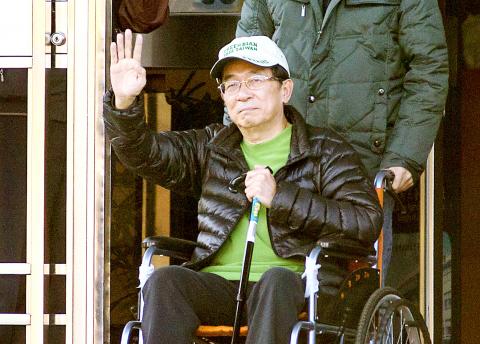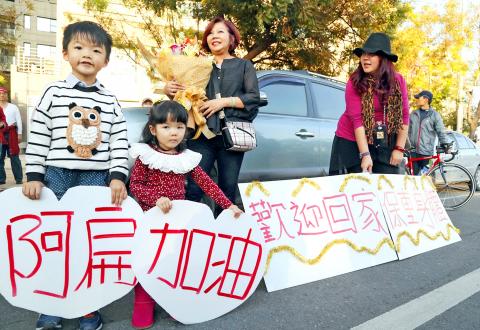Ailing former president Chen Shui-bian (陳水扁) was released from prison on medical parole yesterday, after serving six years for a graft conviction relating to his presidency.
Chen, in a wheelchair and holding a cane, left the prison accompanied by his son, Chen Chih-chung (陳致中), for a month of medical treatment. He waved to a group of supporters waiting outside before boarding a car arranged by prison authorities to take him to his home in Greater Kaohsiung.
As his motorcade — led by police motorcycles — left the prison, some supporters shouted: “A-bian (陳水扁) is not guilty,” and “Go, A-bian,” using the former president’s nickname.

Photo: Reuters
The motorcade navigated throngs of supporters and reporters outside the prison for 10 minutes before breaking free and heading on its way.
Earlier yesterday, a 10-member review panel at the Ministry of Justice’s Agency of Corrections decided to grant the parole in the light of recommendations from a team of doctors who reported a rapid deterioration of Chen Shui-bian’s health since May last year, Deputy Minister of Justice Chen Ming-tang (陳明堂) said.
“His health conditions are complicated and difficult to control. He could die at any time,” Chen Ming-tang said.

Photo: CNA
In a statement, the agency cited the medical team’s report, saying that the 64-year-old is experiencing loss of motor control.
“This type of degeneration occurs in different parts of the brain simultaneously,” it said.
It added that although Chen Shui-bian was being treated by a team of doctors from Taichung Veterans General Hospital, he has not shown any obvious improvement, except for with his sleep apnea.
After careful observation, the medical specialists reported that Chen Shui-bian’s prison environment did not help his health and would lead to worsening illness, the agency said.
The physicians concluded that confinement had seriously affected his health and recommended that he be sent home for care on medical parole, the agency said.
It stressed that the parole is a temporary release on medical grounds and that Chen Shui-bian is required to return to prison once his health stabilizes.
“The parole period will not count toward his prison term,” the agency added.
Taipei Mayor Ko Wen-je (柯文哲), who is also the convener of Chen Shui-bian’s healthcare working group, yesterday called the latter’s release “just the beginning,” given the substantial work ahead in designing a healthcare plan for the veteran politician.
“His going home is not as easy as it looks,” Ko said. “Thought has to be put into his environment and care.”
He gave as an example the need to protect Chen Shui-bian from accidental falls after he gets home.
Ko also expressed support for efforts to curtail the ministry’s power to rule on medical parole cases.
“Chen Shui-bian’s case has shown us that there are no clear rules on the conditions under which prisoners are to be released to receive medical care,” Ko said. “Allowing prison wardens or the Ministry of Justice to unilaterally decide is not ideal, in my opinion.”
Chen Shui-bian was transferred to a prison hospital in April last year after being diagnosed with severe depression, suspected Parkinson’s disease and other conditions.
He attempted to commit suicide in June last year, trying to hang himself with a towel in a prison hospital bathroom, officials said.
Chen Shui-bian’s supporters have recently stepped up their campaign for his early release.
His former deputy, former vice president Annette Lu (呂秀蓮), 70, undertook a three-day hunger strike in a tent late last month to demand that he be freed.
The former Democratic Progressive Party leader ended 50 years of continuous Chinese Nationalist Party (KMT) rule when he came to power in 2000.
After his second term ended in 2008, Chen Shui-bian was sentenced to life in prison in 2009 for money laundering and bribery — a term reduced to 20 years after appeals.
He began serving his sentence on Nov. 11, 2010, but had been detained for nearly two years by then, while prosecutors were investigating and prosecuting the cases.
Chen Shui-bian insists that the charges against him are part of a politically motivated vendetta by the current KMT government in retaliation for his eight years in power promoting Taiwan’s independence.
Additional reporting by Abraham Gerber

Intelligence agents have recorded 510,000 instances of “controversial information” being spread online by the Chinese Communist Party (CCP) so far this year, the National Security Bureau (NSB) said in a report yesterday, as it warned of artificial intelligence (AI) being employed to generate destabilizing misinformation. The bureau submitted a written report to the Legislative Yuan in preparation for National Security Bureau Director-General Tsai Ming-yen’s (蔡明彥) appearance before the Foreign Affairs and National Defense Committee today. The CCP has been using cognitive warfare to divide Taiwanese society by commenting on controversial issues such as Taiwan Semiconductor Manufacturing Co’s (TSMC, 台積電) investments in the

HELPING HAND: The steering committee of the National Stabilization Fund is expected to hold a meeting to discuss how and when to utilize the fund to help buffer the sell-off The TAIEX plunged 2,065.87 points, or 9.7 percent, to close at 19,232.35 yesterday, the highest single-day percentage loss on record, as investors braced for US President Donald Trump’s tariffs after an extended holiday weekend. Amid the pessimistic atmosphere, 945 listed companies led by large-cap stocks — including Taiwan Semiconductor Manufacturing Co (TSMC, 台積電), Hon Hai Precision Industry Co (鴻海精密) and Largan Precision Co (大立光) — fell by the daily maximum of 10 percent at the close, Taiwan Stock Exchange data showed. The number of listed companies ending limit-down set a new record, the exchange said. The TAIEX plunged by daily maxiumu in just

INVESTIGATION: The case is the latest instance of a DPP figure being implicated in an espionage network accused of allegedly leaking information to Chinese intelligence Democratic Progressive Party (DPP) member Ho Jen-chieh (何仁傑) was detained and held incommunicado yesterday on suspicion of spying for China during his tenure as assistant to then-minister of foreign affairs Joseph Wu (吳釗燮). The Taipei District Prosecutors’ Office said Ho was implicated during its investigation into alleged spying activities by former Presidential Office consultant Wu Shang-yu (吳尚雨). Prosecutors said there is reason to believe Ho breached the National Security Act (國家安全法) by leaking classified Ministry of Foreign Affairs information to Chinese intelligence. Following interrogation, prosecutors petitioned the Taipei District Court to detain Ho, citing concerns over potential collusion or tampering of evidence. The

‘COMPREHENSIVE PLAN’: Lin Chia-lung said that the government was ready to talk about a variety of issues, including investment in and purchases from the US The National Stabilization Fund (NSF) yesterday announced that it would step in to staunch stock market losses for the ninth time in the nation’s history. An NSF board meeting, originally scheduled for Monday next week, was moved to yesterday after stocks plummeted in the wake of US President Donald Trump’s announcement of 32 percent tariffs on Taiwan on Wednesday last week. Board members voted to support the stock market with the NT$500 billion (US$15.15 billion) fund, with injections of funds to begin as soon as today. The NSF in 2000 injected NT$120 billion to stabilize stocks, the most ever. The lowest amount it